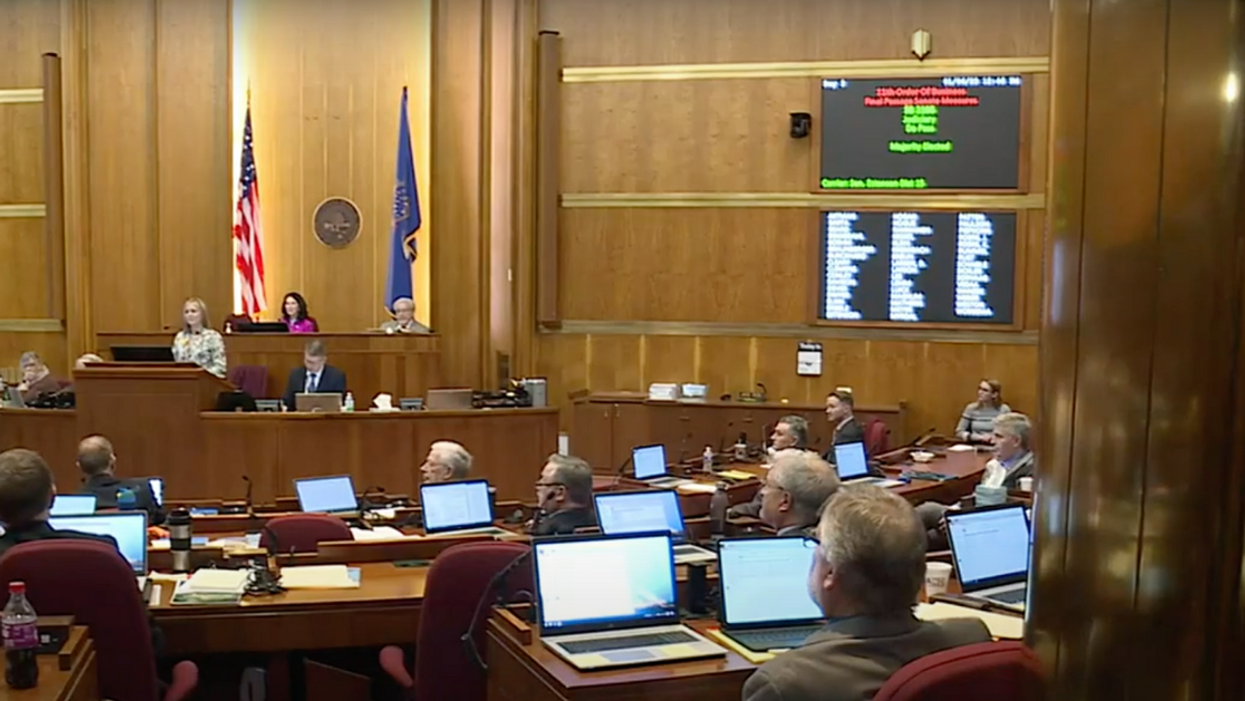North Dakota's Senate recently passed a bill that allows its members to have more access to free food, but rejected a separate proposal that aimed to provide free lunches for underprivileged schoolchildren.
The bill, which is now awaiting Republican Governor Doug Burgum's signature, will permit state employees to collect up to $45 a day for their meals while traveling within the state, a $10 increase from the current daily allowance of $35. This change would cost taxpayers $1 million over the next two years.
Meanwhile, a bill that would have allotted $6 million over two years to offer free lunches to K-12 students who live at or below 200% of the federal poverty level failed by just one vote.
According to regional news source The Forum, 13 Republicans voted against the school meal proposal while also supporting the reimbursement for state employees, with no Democrats doing the same.
Senate Minority Leader Kathy Hogan criticized the Senate's decision, stating that it was "very self-serving" and questioned how members could vote for themselves while ignoring the needs of children.
On the other hand, Republican Assistant Majority Leader Jerry Klein claimed that he could not see any relationship between the two bills.
State Republican Senator Mike Wobbema said that he opposes free school meals for underprivileged children, citing "personal responsibility" and stating that parents are to blame for their children going hungry.
Wobbema argued that if kids are opting "to eat in the first place," it is a result of parental negligence and that it is not the responsibility of the school district or the state of North Dakota to address the issue.
Many have condemned the North Dakota GOP's action.
It is critical to acknowledge that providing free school meals to underprivileged children is not only an ethical obligation but also a wise investment.
Providing free lunches to students who cannot afford them is a proven method of addressing child hunger and poverty, improving educational outcomes, and reducing food insecurity. Additionally, free school meals can benefit local economies by boosting sales at grocery stores and other food retailers.
According to the Food Research & Action Center (FRAC), school lunch "is critical to student health and well-being, especially for low-income students—and ensures that students have nutrition they need throughout the day to learn" and school meal nutrition standards "are having a positive impact on student food selection and consumption, especially for fruits and vegetables."








 The Benny Show
The Benny Show





 @neilforreal/Bluesky
@neilforreal/Bluesky @savannahcat/Bluesky
@savannahcat/Bluesky @qadishtujessica.inanna.app
@qadishtujessica.inanna.app @v-ron/Bluesky
@v-ron/Bluesky @nelnelnellie/Bluesky
@nelnelnellie/Bluesky @beatlenumber9/Bluesky
@beatlenumber9/Bluesky @pinkzombierose/Bluesky
@pinkzombierose/Bluesky
 @theunobsolete/TikTok
@theunobsolete/TikTok @theunobsolete/TikTok
@theunobsolete/TikTok @theunobsolete/TikTok
@theunobsolete/TikTok @theunobsolete/TikTok
@theunobsolete/TikTok @theunobsolete/TikTok
@theunobsolete/TikTok @theunobsolete/TikTok
@theunobsolete/TikTok @theunobsolete/TikTok
@theunobsolete/TikTok @theunobsolete/TikTok
@theunobsolete/TikTok @theunobsolete/TikTok
@theunobsolete/TikTok @theunobsolete/TikTok
@theunobsolete/TikTok @theunobsolete/TikTok
@theunobsolete/TikTok @theunobsolete/TikTok
@theunobsolete/TikTok @theunobsolete/TikTok
@theunobsolete/TikTok @theunobsolete/TikTok
@theunobsolete/TikTok @theunobsolete/TikTok
@theunobsolete/TikTok @theunobsolete/TikTok
@theunobsolete/TikTok @theunobsolete/TikTok
@theunobsolete/TikTok
 @laysuperstar/TikTok
@laysuperstar/TikTok @laysuperstar/TikTok
@laysuperstar/TikTok @laysuperstar/TikTok
@laysuperstar/TikTok @laysuperstar/TikTok
@laysuperstar/TikTok @laysuperstar/TikTok
@laysuperstar/TikTok @laysuperstar/TikTok
@laysuperstar/TikTok @laysuperstar/TikTok
@laysuperstar/TikTok @laysuperstar/TikTok
@laysuperstar/TikTok @laysuperstar/TikTok
@laysuperstar/TikTok @laysuperstar/TikTok
@laysuperstar/TikTok @laysuperstar/TikTok
@laysuperstar/TikTok @laysuperstar/TikTok
@laysuperstar/TikTok @laysuperstar/TikTok
@laysuperstar/TikTok @laysuperstar/TikTok
@laysuperstar/TikTok @laysuperstar/TikTok
@laysuperstar/TikTok